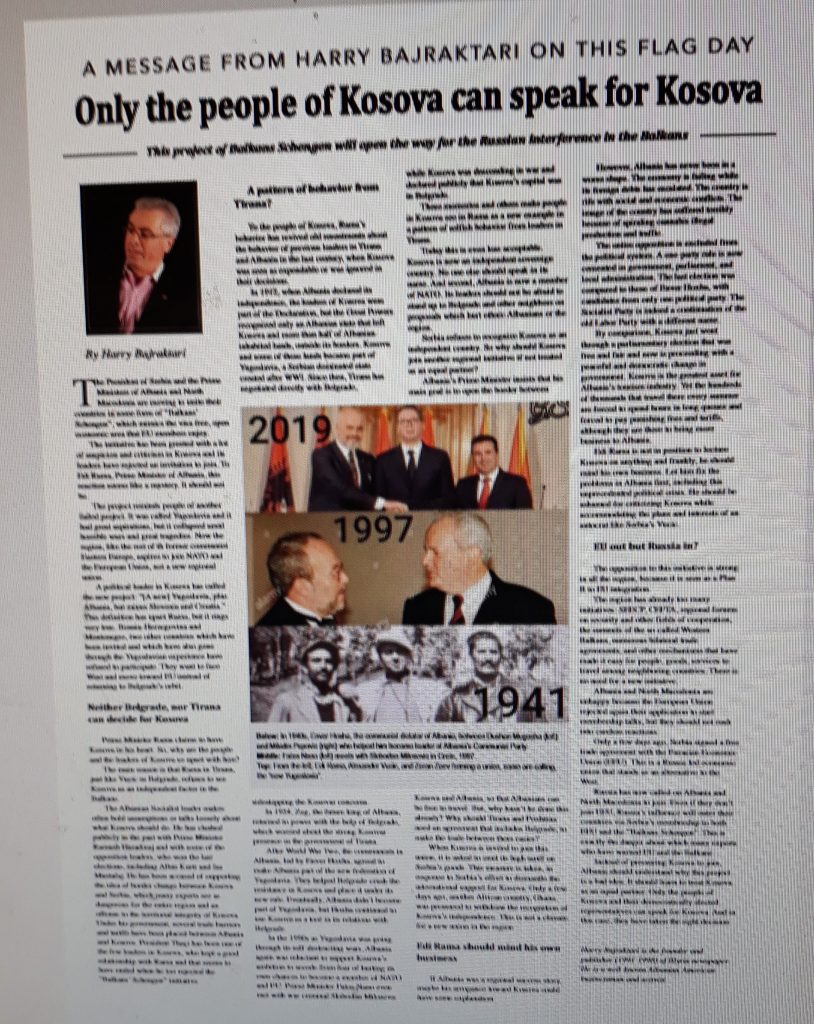- This project of Balkans Schengen will open the way for the Russian interference in the Balkans /
By Harry BAJRAKTARI/ DIELLI/



The President of Serbia and the Prime Ministers of Albania and North Macedonia are moving to unite their countries in some form of “Balkans’ Schengen”, which mimics the visa-free, open economic area that EU members enjoy.
The initiative has been greeted with a lot of suspicion and criticism in Kosova and its leaders have rejected an invitation to join. To Edi Rama, Prime Minister of Albania, this reaction seems like a mystery. It should not be.
The project reminds people of another failed project. It was called Yugoslavia and it had great aspirations, but it collapsed amid horrible wars and great tragedies. Now the region, like the rest of th former communist Eastern Europe, aspires to join NATO and the European Union, not a new regional union.
A political leader in Kosova has called the new project: “[A new] Yugoslavia, plus Albania, but minus Slovenia and Croatia.” This definition has upset Rama, but it rings very true. Bosnia-Herzegovina and Montenegro, two other countries which have been invited and which have also gone through the Yugoslavian experience have refused to participate. They want to face West and move toward EU instead of returning to Belgrade’s orbit.
Neither Belgrade, nor Tirana can decide for Kosova
Prime Minister Rama claims to have Kosova in his heart. So, why are the people and the leaders of Kosova so upset with him?
The main reason is that Rama in Tirana, just like Vucic in Belgrade, refuses to see Kosova as an independent factor in the Balkans.
The Albanian Socialist leader makes often bold assumptions or talks loosely about what Kosova should do. He has clashed publicly in the past with Prime Minister Ramush Haradinaj and with some of the opposition leaders, who won the last elections, including Albin Kurti and Isa Mustafaj. He has been accused of supporting the idea of border change between Kosova and Serbia, which many experts see as dangerous for the entire region and an offense to the territorial integrity of Kosova. Under his government, several trade barriers and tariffs have been placed between Albania and Kosova. President Thaçi has been one of the few leaders in Kosova, who kept a good relationship with Rama and that seems to have ended when he too rejected the “Balkans’ Schengen” initiative.
A pattern of behavior from Tirana?
To the people of Kosova, Rama’s behavior has revived old resentments about the behavior of previous leaders in Tirana and Albania in the last century, when Kosova was seen as expendable or was ignored in their decisions.
In 1912, when Albania declared its independence, the leaders of Kosova were part of the Declaration, but the Great Powers recognized only an Albanian state that left Kosova and more than half of Albanian-inhabited lands, outside its borders. Kosova and some of these lands became part of Yugoslavia, a Serbian dominated state created after WWI. Since then, Tirana has negotiated directly with Belgrade, sidestepping the Kosovar concerns.
In 1924, Zog, the future king of Albania, returned to power with the help of Belgrade, which worried about the strong Kosovar presence in the government of Tirana.
After World War Two, the communists in Albania, led by Enver Hoxha, agreed to make Albania part of the new federation of Yugoslavia. They helped Belgrade crush the resistance in Kosova and place it under its new rule. Eventually, Albania didn’t become part of Yugoslavia, but Hoxha continued to use Kosova as a tool in its relations with Belgrade.
In the 1990s as Yugoslavia was going through its self-destructing wars, Albania again was reluctant to support Kosova’s ambition to secede from fear of hurting its own chances to become a member of NATO and EU. Prime Minister Fatos Nano even met with war criminal Slobodan Milosevic while Kosova was descending in war and declared publicly that Kosova’s capital was in Belgrade.
These memories and others make people in Kosova see in Rama as a new example in a pattern of selfish behavior from leaders in Tirana.
Today this is even less acceptable. Kosova is now an independent sovereign country. No one else should speak in its name. And second, Albania is now a member of NATO. Its leaders should not be afraid to stand up to Belgrade and other neighbors on proposals which hurt ethnic Albanians or the region.
Serbia refuses to recognize Kosova as an independent country. So why should Kosova join another regional initiative if not treated as an equal partner?
Albania’s Prime Minister insists that his main goal is to open the border between Kosova and Albania, so that Albanians can be free to travel. But, why hasn’t he done this already? Why should Tirana and Prishtina need an agreement that includes Belgrade, to make the trade between them easier?
When Kosova is invited to join this union, it is asked to omit its high tariff on Serbia’s goods. This measure is taken, in response to Serbia’s effort to dismantle the international support for Kosova. Only a few days ago, another African country, Ghana, was pressured to withdraw the recognition of Kosova’s independence. This is not a climate for a new union in the region.
Edi Rama should mind his own business
If Albania was a regional success story, maybe his arrogance toward Kosova could have some explanation.
However, Albania has never been in a worse shape. The economy is failing while its foreign debts has escalated. The country is rife with social and economic conflicts. The image of the country has suffered terribly because of spiraling cannabis illegal production and traffic.
The entire opposition is excluded from the political system. A one-party rule is now cemented in government, parliament, and local administration. The last election was compared to those of Enver Hoxha, with candidates from only one political party. The Socialist Party is indeed a continuation of the old Labor Party with a different name.
By comparison, Kosova just went through a parliamentary election that was free and fair and now is proceeding with a peaceful and democratic change in government. Kosova is the greatest asset for Albania’s tourism industry. Yet the hundreds of thousands that travel there every summer are forced to spend hours in long queues and forced to pay punishing fees and tariffs, although they are there to bring more business to Albania.
Edi Rama is not in position to lecture Kosova on anything and frankly, he should mind his own business. Let him fix the problems in Albania first, including this unprecedented political crisis. He should be ashamed for criticizing Kosova while accommodating the plans and interests of an autocrat like Serbia’s Vucic.
EU out but Russia in?
The opposition to this initiative is strong in all the region, because it is seen as a Plan B to EU integration.
The region has already too many initiatives: SEECP, CEFTA, regional forums on security and other fields of cooperation, the summits of the so-called Western Balkans, numerous bilateral trade agreements, and other mechanisms that have made it easy for people, goods, services to travel among neighboring countries. There is no need for a new initiative.
Albania and North Macedonia are unhappy because the European Union rejected again their application to start membership talks, but they should not rush into careless reactions.
Only a few days ago, Serbia signed a free trade agreement with the Eurasian Economic Union (EEU). This is a Russia-led economic union that stands as an alternative to the West.
Russia has now called on Albania and North Macedonia to join. Even if they don’t join EEU, Russia’s influence will enter their countries via Serbia’s membership to both EEU and the “Balkans Schengen”. This is exactly the danger about which many experts who have warned EU and the Balkans.
Instead of pressuring Kosova to join, Albania should understand why this project is a bad idea. It should learn to treat Kosova as an equal partner. Only the people of Kosova and their democratically elected representatives can speak for Kosova. And in this case, they have taken the right decision.
Harry Bajraktari is the founder and publisher (1991-1998) of Illyria newspaper. He is a well-known Albanian-American businessman and activist.